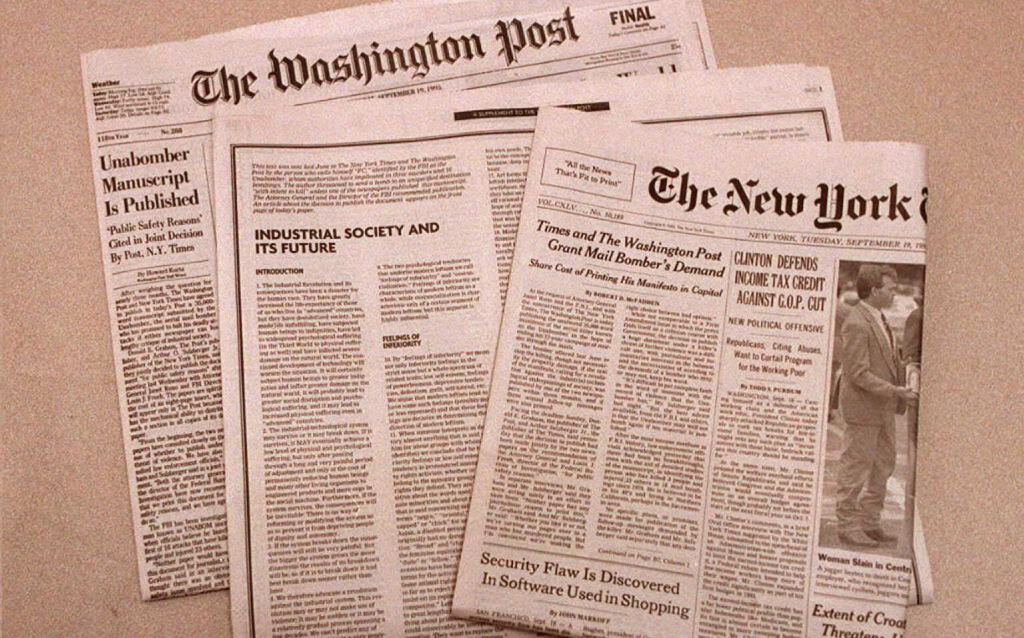On May 25, 1978, the first bomb of 16 made by Theodore Kaczynski went off, causing the recipient minor injuries. With each new package Kaczynski made, the bombs were more sophisticated, and fear gripped the public.
The Unabomber, as he came to be known as — “UN” for university and “A” for airline, which were two of his main targets — was reclusive, wily and dangerous.
“This guy left practically no way to trace back any evidence that was left at the scene — parts of the bombs, components, anything else,” said Special Agent Kathleen Puckett, who worked on the task force, according to the FBI. “He was a real cipher.
[firefly_embed]
[/firefly_embed]
“The profiling unit usually has a lot of evidence at a scene to review to come up with a profile of an unknown offender. In this case, they had no latent fingerprints, no hair and fibers that led anywhere, not even — even, in some of these devices along the way, the batteries were even stripped. You couldn’t even trace the batteries back to where they were purchased or acquired. And a lot of the wood and different things looked just like junk that was picked up by the side of the road.”
But for all the false clues and meticulous scrubbing, it was his own writing style that eventually gave him away.
According to the FBI, after Kaczynski released a 35,000-word manifesto in 1995 and it was made widely available, his brother David recognized his style of writing, provided authorities with a variety of documents from Ted and helped end his reign of terror.
[firefly_embed]
[/firefly_embed]
Since his arrest on April 3, 1996, Kaczynski has been in prison, where he will remain for the rest of his life serving eight consecutive life sentences.
Author Jack Epstein has recently come forward with two more relics from the same timeline as Kaczynski’s destructive spree.
[firefly_embed]
[/firefly_embed]
“Forty-two years ago, I gave the Unabomber travel advice,” Epstein told the San Francisco Chronicle. “I didn’t know back when Ted Kaczynski and I were exchanging letters that he would become one of America’s most infamous domestic terrorists.”
Epstein said that he discovered he’d had two letters from the murderer tucked away, “in scores of files buried in boxes that crowded my attic,” that he found while cleaning, according to Newsweek.
The first letter arrived on May 24, 1979, a day shy of a year after the first bombing, but long before Kaczynski’s identity was known.
Epstein had written a book that Kaczynski had read and had further questions about — something that seemed innocent at the time but has taken on a darker meaning.
“Kaczynski wrote me because he’d read my book ‘Along the Gringo Trail: A Budget Travel Guide to Latin America,’ based on my 18 months backpacking between Mexico and Argentina’s Tierra del Fuego,” Epstein said.
“The guidebook was written for travelers with little money but plenty of time. It included many places on roads less traveled, which is what probably piqued Kaczynski’s interest.
“Kaczynski wrote that he and his brother needed advice on finding ‘a small plot of land, in a location as remote from civilization as possible, on which we would live as self-sufficiently as we are able. By ‘wilderness,’ I mean a place where the nearest neighbor is, say, five miles away and preferably further.'”
While Epstein hadn’t had the sort of specific information Kaczynski seemed to be looking for, the exchange was polite. Kaczynski wrote back, his second letter arriving on Aug. 27, 1979.
According to Epstein, in that letter Kaczynski was grateful for the author’s “helpful and courteous reply to [his] recent inquiry” and attributed the delay in his reply to the fact that he “was off in the hills for a considerable time, out of touch with everything.”
The Chronicle’s Jack Epstein kept copies of letters he’d received from readers in the ’70s buried in boxes that crowded his attic until a couple of weeks ago, when his wife insisted that he pare them down. Only then did he realize their significance.https://t.co/7wce5HlrdY
— San Francisco Chronicle (@sfchronicle) September 17, 2021
Of course, one of the rural places that Kaczynski spent much time at and that became infamous in 1996 was the tiny shack of a cabin near Lincoln, Montana, where Kaczynski was arrested. It was the place he went to plan his attacks.
Armed with hindsight, Epstein has a hunch as to why the criminal was asking for such particular information back in 1979: “I can only theorize that Kaczynski wrote me because he knew that one day he would need to flee U.S. law enforcement for a South American haven.”
This article appeared originally on The Western Journal.















 Continue with Google
Continue with Google